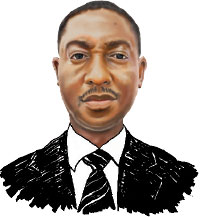It was meant to be a short wait of about one hour at the departure lounge of the Margaret Ekpo International Airport, Calabar, last Monday, after I had checked in for my flight back to Abuja. The recently refurbished departure hall looked very neat, but with very few passengers at the time, I got in. Happily, the lone cafe was open, so I advanced to get a cuppa and snack. But my hope of peaceable and relaxing wait was soon shattered by the loud music that enveloped the hall. It was a popular Christian music, the type you are likely to hear at worship sessions during church service. I had to remind myself that I was still in a public space in a country whose constitution clearly states: “The government of the federation or of a state shall not adopt any religion as state religion.” So who converted this space to a religious space?
The music was so loud to be mistaken as coming from official quarters or public address system of the airport, more so as many around seemed to have accepted what was going on. I soon realised that the music was emanating from one of the shops in the hall where music compact discs were on sale. I thought that was an unacceptable intrusion. While that was going on, two big plasma televisions in the airport hall were tuned to CNN, but the audio muted. Thus we were punished to watch visuals of the news channels but listen to religious music while we waited. How our brains were meant to synthesise the two pieces of information was not the business of the managers of the airport.
With time, we approached the information desk of the airport and requested their intervention to allow us watch and hear the television and reduce the noise level from the CD merchant. And happily they complied.
While taking in all of that, I wondered to myself how it would feel if, while waiting for a flight in another federal airport, say in Kano or Katsina, I was equally treated to a loud rendition of Islamic music. Or what if I was in another airport and forced to listen to local music or audio tape of comedy rendered in a local language? It would all be unfair in all those circumstances, no doubt. But how many people notice or realise that?
There is clearly ignorance among citizens as to the meaning of the constitutional provision cited above, or there is deliberate attempt by many state institutions and officials to undermine the constitution. Otherwise, what would one make of some of the religiously-divisive actions of the state and its officials. Why would a state that is not meant to promote any religion as state religion justify its creation and funding of institutions and systems meant to sponsor some citizens to carry out their religious activities which fall in the realm of their private lives?
One reason this happens is because many see religion as the only thing that defines them and feel compelled to push their religion to all frontiers and shove it in the faces of others, willy-nilly. They dwell on the outer display of religiosity, even when they lack the internal knowledge and discipline expected of their faith.
Another reason our public spaces and property are taken over by private interests and idiosyncrasies is because many people see the office they occupy or manage as an extension of their private space. Thus we have so many ‘sole administrators’ doting our public spaces and reconstructing those spaces in their own images and interests. And because our institutions are often so weak, they cannot define the people who manage them; rather, the people define the institutions. This explains why the same institution could be seen as operating different standards under different leaders, sometimes in very widely contradictory manners.
It is even made worse by the fact that we have a populace that push the occupier of an office to ‘represent’ their identities and bring back part of the public or common wealth and opportunities to those interests, since it is ‘their turn’. This explains the ‘Turn-by-turn Nigeria Limited’ jokes we often hear. And this also explains why our politics is often reduced to ethnic, religious and cultural sentiments. The state or public space is seen as a distant space to be poached for personal, private benefit of whoever finds him/herself there.
Just think about it: how many times have you been in a waiting area of, say, a hospital and the television is tuned to a channel showing a programme that is inappropriate for all age ranges or sensitive to our diversities? It may be tuned to a movie channel showing an x-rated or 18+ movie, yet the public space is open to everyone, including children. Truth is, the staff responsible for tuning the channel and may be some of the medical staff in the hospital see the television as an extension of their private viewing and just want to watch what is of interest to them; the public interest does not concern them.
This may seem like trifle to many, but this is the attitude that we eventually grow with when we are elevated to higher public offices and spaces. Addressing this will require more focus on teachings on moral, ethics, fairness, mutual coexistence etc, not just for children in schools, but more for our religious and traditional institutions and leaders.













